TOPGRADE
I HELP STUDENTS WITH REVISION MATERIALS WITH BETTER GRADES GUARANTEED. BEST OF LUCK.
- 9327
- 0
- 383
Community
- Followers
- Following
16 Reviews received
9716 items
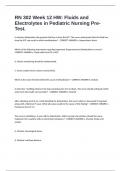
RN 302 Week 12 HW: Fluids and Electrolytes in Pediatric Nursing Pre-Test.
RN 302 Week 12 HW: Fluids and Electrolytes in Pediatric Nursing Pre-Test. In isotonic dehydration the greatest fluid loss is from the ECF. The nurse understands that this fluid loss from the ECF can result in which manifestation? - CORRECT ANSWER a. Hypovolemic shock Which of the following statements regarding hypertonic (hypernatremic) dehydration is correct? - CORRECT ANSWER a. Fluids shift from ICF to ECF. d. Seizure monitoring should be implemented. e. Serum sodium level is above...
- Package deal
- Exam (elaborations)
- • 2 pages •
RN 302 Week 12 HW: Fluids and Electrolytes in Pediatric Nursing Pre-Test. In isotonic dehydration the greatest fluid loss is from the ECF. The nurse understands that this fluid loss from the ECF can result in which manifestation? - CORRECT ANSWER a. Hypovolemic shock Which of the following statements regarding hypertonic (hypernatremic) dehydration is correct? - CORRECT ANSWER a. Fluids shift from ICF to ECF. d. Seizure monitoring should be implemented. e. Serum sodium level is above...
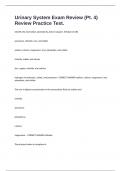
Urinary System Exam Review (Pt. 4) Review Practice Test.
Urinary System Exam Review (Pt. 4) Review Practice Test. Identify the electrolytes absorbed by active transport. (Module 25.3B) potassium, chloride, iron, and iodide sodium, calcium, magnesium, iron, phosphate, and sulfate chloride, iodide, and nitrate zinc, copper, chloride, and calcium hydrogen, bicarbonate, sulfate, and potassium - CORRECT ANSWER sodium, calcium, magnesium, iron, phosphate, and sulfate The ions in highest concentration in the extracellular fluid are sodiu...
- Package deal
- Exam (elaborations)
- • 24 pages •
Urinary System Exam Review (Pt. 4) Review Practice Test. Identify the electrolytes absorbed by active transport. (Module 25.3B) potassium, chloride, iron, and iodide sodium, calcium, magnesium, iron, phosphate, and sulfate chloride, iodide, and nitrate zinc, copper, chloride, and calcium hydrogen, bicarbonate, sulfate, and potassium - CORRECT ANSWER sodium, calcium, magnesium, iron, phosphate, and sulfate The ions in highest concentration in the extracellular fluid are sodiu...
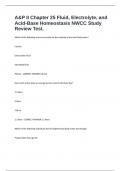
A&P II Chapter 25 Fluid, Electrolyte, and Acid-Base Homeostasis NWCC Study Review Test.
A&P II Chapter 25 Fluid, Electrolyte, and Acid-Base Homeostasis NWCC Study Review Test. Which of the following sources accounts for the majority of our total body water? Cytosol Extracellular fluid Interstitial fluid Plasma - CORRECT ANSWER Cytosol How much water does an average person need to drink per day? 1.5 liters 5 liters 750 ml 2.5 liters - CORRECT ANSWER 1.5 liters Which of the following individuals has the highest total body water percentage? People o...
- Package deal
- Exam (elaborations)
- • 44 pages •
A&P II Chapter 25 Fluid, Electrolyte, and Acid-Base Homeostasis NWCC Study Review Test. Which of the following sources accounts for the majority of our total body water? Cytosol Extracellular fluid Interstitial fluid Plasma - CORRECT ANSWER Cytosol How much water does an average person need to drink per day? 1.5 liters 5 liters 750 ml 2.5 liters - CORRECT ANSWER 1.5 liters Which of the following individuals has the highest total body water percentage? People o...
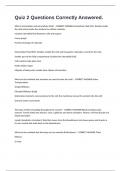
Quiz 2 Questions Correctly Answered.
Quiz 2 Questions Correctly Answered. What is intracellular and extracellular fluid? - CORRECT ANSWER Intracellular Fluid (ICF)- Resides inside the cells and provides the medium for cellular reactions. Includes interstitial fluid (between cells and organs) Forms lymph Permits exchange of materials. Extracellular Fluid (ECF)- Resides outside the cells and transports materials to and from the cells. Smaller part of the fluid compartment (includes the interstitial fluid) Cell reactions ta...
- Package deal
- Exam (elaborations)
- • 2 pages •
Quiz 2 Questions Correctly Answered. What is intracellular and extracellular fluid? - CORRECT ANSWER Intracellular Fluid (ICF)- Resides inside the cells and provides the medium for cellular reactions. Includes interstitial fluid (between cells and organs) Forms lymph Permits exchange of materials. Extracellular Fluid (ECF)- Resides outside the cells and transports materials to and from the cells. Smaller part of the fluid compartment (includes the interstitial fluid) Cell reactions ta...
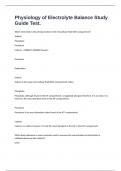
Physiology of Electrolyte Balance Study Guide Test.
Physiology of Electrolyte Balance Study Guide Test. Which electrolyte is the principal cation in the intracellular fluid (ICF) compartment? Sodium Phosphate Potassium Calcium - CORRECT ANSWER Answer: Potassium Explanation: Sodium Sodium is the major extracellular fluid (ECF) compartment cation. Phosphate Phosphate, although found in the ICF compartment, is negatively charged; therefore, it is an anion. It is, however, the most abundant anion in the ICF compartment. Pota...
- Package deal
- Exam (elaborations)
- • 15 pages •
Physiology of Electrolyte Balance Study Guide Test. Which electrolyte is the principal cation in the intracellular fluid (ICF) compartment? Sodium Phosphate Potassium Calcium - CORRECT ANSWER Answer: Potassium Explanation: Sodium Sodium is the major extracellular fluid (ECF) compartment cation. Phosphate Phosphate, although found in the ICF compartment, is negatively charged; therefore, it is an anion. It is, however, the most abundant anion in the ICF compartment. Pota...
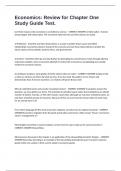
Economics: Review for Chapter One Study Guide Test.
Economics: Review for Chapter One Study Guide Test. List three reasons why economics is considered a science. - CORRECT ANSWER 1) Observation - Science always begins with observation. The economist observes how and why choices are made. 2) Prediction - Scientists use their observations as a basis to predict future cause-and-effect relationships. Economists observe trends of the economy and use those observations to predict the future choices of households, business firms, and governments....
- Package deal
- Exam (elaborations)
- • 2 pages •
Economics: Review for Chapter One Study Guide Test. List three reasons why economics is considered a science. - CORRECT ANSWER 1) Observation - Science always begins with observation. The economist observes how and why choices are made. 2) Prediction - Scientists use their observations as a basis to predict future cause-and-effect relationships. Economists observe trends of the economy and use those observations to predict the future choices of households, business firms, and governments....
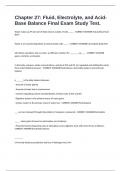
Chapter 27: Fluid, Electrolyte, and Acid-Base Balance Final Exam Study Test.
Chapter 27: Fluid, Electrolyte, and Acid-Base Balance Final Exam Study Test. Water makes up 99 percent of fluid volume outside of cells, ____ - CORRECT ANSWER Extracellular fluid (ECF) Water is an essential ingredient of cytosol inside cells, ____ - CORRECT ANSWER Intracellular fluid (ICF) All cellular operations rely on water, as diffusion medium for ____,____&____ - CORRECT ANSWER gases, nutrients, and wastes In the body, volumes, solute concentrations, and pH of ECF and ICF are re...
- Package deal
- Exam (elaborations)
- • 21 pages •
Chapter 27: Fluid, Electrolyte, and Acid-Base Balance Final Exam Study Test. Water makes up 99 percent of fluid volume outside of cells, ____ - CORRECT ANSWER Extracellular fluid (ECF) Water is an essential ingredient of cytosol inside cells, ____ - CORRECT ANSWER Intracellular fluid (ICF) All cellular operations rely on water, as diffusion medium for ____,____&____ - CORRECT ANSWER gases, nutrients, and wastes In the body, volumes, solute concentrations, and pH of ECF and ICF are re...
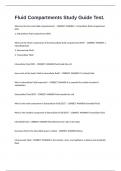
Fluid Compartments Study Guide Test.
Fluid Compartments Study Guide Test. What are the two main fluid compartments? - CORRECT ANSWER 1. Intracellular fluid compartment (ICF) 2. Extracellular fluid compartment (ECF) What are the three components of the Extracellular fluid compartment (ECF)? - CORRECT ANSWER 1. Interstitial Fluid 2. Intravascular Fluid 3. Transcellular Fluid Intracellular Fluid (ICF) - CORRECT ANSWER Fluid inside the cell How much of the body's fluid is intracellular fluid? - CORRECT ANSWER 2/3 of b...
- Package deal
- Exam (elaborations)
- • 2 pages •
Fluid Compartments Study Guide Test. What are the two main fluid compartments? - CORRECT ANSWER 1. Intracellular fluid compartment (ICF) 2. Extracellular fluid compartment (ECF) What are the three components of the Extracellular fluid compartment (ECF)? - CORRECT ANSWER 1. Interstitial Fluid 2. Intravascular Fluid 3. Transcellular Fluid Intracellular Fluid (ICF) - CORRECT ANSWER Fluid inside the cell How much of the body's fluid is intracellular fluid? - CORRECT ANSWER 2/3 of b...
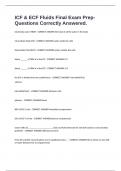
ICF & ECF Fluids Final Exam Prep-Questions Correctly Answered.
ICF & ECF Fluids Final Exam Prep-Questions Correctly Answered. total body water (TBW) - CORRECT ANSWER the total of all the water in the body Intracellular fluid (ICF) - CORRECT ANSWER water inside the cells Extracellular fluid (ECF) - CORRECT ANSWER water outside the cells about ______ of TBW is In the ICF - CORRECT ANSWER 2/3 about ______ of TBW is in the ECF - CORRECT ANSWER 1/3 the ECF is divided into two subdivisions: - CORRECT ANSWER -interstitial fluid -plasma inters...
- Package deal
- Exam (elaborations)
- • 4 pages •
ICF & ECF Fluids Final Exam Prep-Questions Correctly Answered. total body water (TBW) - CORRECT ANSWER the total of all the water in the body Intracellular fluid (ICF) - CORRECT ANSWER water inside the cells Extracellular fluid (ECF) - CORRECT ANSWER water outside the cells about ______ of TBW is In the ICF - CORRECT ANSWER 2/3 about ______ of TBW is in the ECF - CORRECT ANSWER 1/3 the ECF is divided into two subdivisions: - CORRECT ANSWER -interstitial fluid -plasma inters...
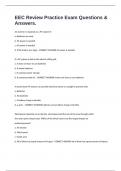
EEC Review Practice Exam Questions & Answers.
EEC Review Practice Exam Questions & Answers. An inverter is required on a PV system if: a. Batteries are used b. DC power is needed c. AC power is needed d. If the load is very large - CORRECT ANSWER AC power is needed If a PV system is tied to the electric utility grid: a. It does not have to use batteries b. It needs batteries c. It requires power storage d. It cannot provide AC - CORRECT ANSWER it does not have to use batteries A stand-alone PV system can provide electricit...
- Package deal
- Exam (elaborations)
- • 6 pages •
EEC Review Practice Exam Questions & Answers. An inverter is required on a PV system if: a. Batteries are used b. DC power is needed c. AC power is needed d. If the load is very large - CORRECT ANSWER AC power is needed If a PV system is tied to the electric utility grid: a. It does not have to use batteries b. It needs batteries c. It requires power storage d. It cannot provide AC - CORRECT ANSWER it does not have to use batteries A stand-alone PV system can provide electricit...

AMCA PCT STUDY GUIDE TEST 2024.
CPB Certified Professional Biller Certification Study Guide Test 2024.
Peds Quiz 4 Correctly Answered 2024.
CMN 554- Unit 3 Review Test.
CHPA.5 PRACTICE TEST 2024.